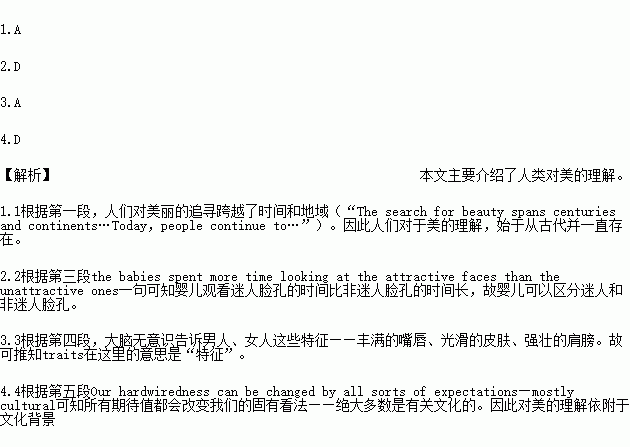题目内容
The Enigma(谜)of Beauty
The search for beauty spans centuries and continents.Paintings of Egyptians dating back over 4,000 years show both men and women painting their nails and wearing makeup.In 18th-century France, wealthy noblemen wore large wigs (假发) of long, white hair to make themselves attractive.Today, people continue to devote a lot of time and money to their appearance.
There is at least one good reason for the desire to be attractive: beauty is power.Studies suggest that good-looking people make more money, get called on more often in class, and are regarded as friendlier.
But what exactly is beauty? It’s difficult to describe it clearly, and yet we know it when we see it.And our awareness of it may start at a very early age.In one set of studies, six-month-old babies were shown a series of photographs.The faces on the pictures had been rated for attractiveness by a group of college students.In the studies, the babies spent more time looking at the attractive faces than the unattractive ones.
The idea that even babies can judge appearance makes perfect sense to many researchers.In studies by psychologists, men consistently showed a preference for women with larger eyes, fuller lips, and a smaller nose and chin while women prefer men with large shoulders and a narrow waist.According to scientists, the mind unconsciously tells men and women that these traits—the full lips, clear skin, strong shoulders—equal health and genetic well-being.
Not everyone thinks the same way, however.“Our hardwiredness can be changed by all sorts of expectations—mostly cultural,” says C.Loring Brace, an anthropologist at the University of Michigan.What is considered attractive in one culture might not be in another.Look at most Western fashion magazines: the women on the pages are thin.But is this “perfect” body type for women worldwide? Scientists’ answer is no; what is considered beautiful is subjective and varies around the world.They found native peoples in southeast Peru preferred shapes regarded overweight in Western cultures.
For better or worse, beauty plays a role in our lives.But it is extremely difficult to describe exactly what makes one person attractive to another.Although there do seem to be certain physical traits considered universally appealing, it is also true that beauty does not always keep to a single, uniform standard.Beauty really is, as the saying goes, in the eye of the beholder.
1.People’s ideas about beauty _______.
A.have existed since ancient times
B.can be easily described
C.have little influence on a person’s success
D.are based upon strict criteria
2.In Paragraph 3, the babies in the study _______.
A.were rated for their appearance
B.were entered in a beauty contest
C.were shown photos of a group of college students
D.were able to tell attractive faces from unattractive ones
3.The underlined word “traits” in Paragraph 4 probably means _______.
A.Qualities
B.measurements
C.Judgments
D.standards
4.We can learn from the passage that _______.
A.the ideas of beauty vary as people grow up
B.the search for beauty is rooted in lack of confidence
C.the standards for beauty are based on scientific researches
D.the understanding of beauty depends on cultural backgrounds
 天天向上一本好卷系列答案
天天向上一本好卷系列答案 小学生10分钟应用题系列答案
小学生10分钟应用题系列答案 目标测试系列答案
目标测试系列答案请认真阅读下列短文,并根据短文的内容要点完成文章后的表格列单。
注意:补全填空应符合语法和搭配要求,每空只填一个单词。请将答案写在答题卡上相应题号的横线上。
Friends in your life are like pillars on your porch.Sometimes they hold you up and sometimes they lean on you.Sometimes it's just enough to know they're standing by.Friendship doubles your joy and divides your grief.A friendship is priceless and should be cultivated.
●Remembering the golden rule
Without a doubt, the greatest human relations principle is to treat other people like you want to be treated. When you show respect for your friends and gratitude for their friendship, you'll be blessed in untold ways.
You can't know what has gone on in the rude person's life that day, but you can assume that his or her day hasn't gone well.Maybe a loved one lost his job, her boss reprimanded her unjustly, he's coming down with the flu, or she just found out that her teenager is taking drugs.
Whatever the cause of the rudeness, you don't have to accentuate(突出) the problem.A kind word or a gentle, understanding smile may help the person more than returned rudeness would.
● Considering foes as friends
A friend looks after your own good. On the other hand, a foe is someone who isn't interested in your well-being.
Yet some students view their teachers as enemies.However, a student's success in school partly depends on the teacher's effectiveness in the classroom.Instead of being an enemy, a teacher who corrects you and helps you to achieve can be the best friend you ever had.
This kind of thinking, along with a little attitude adjustment, helps you to convert foes to friends, and both of you are better off.
● Making friends by being an optimist
Do you enjoy being around a pessimist, someone who is generally described as being able to brighten up a room just by leaving it? The answer is obvious.Most people prefer to be around people who believe that tomorrow is going to be better than today, rather than people who believe that today is even worse than yesterday.
● Capturing the pleasing personality
How do you develop a pleasing personality? Here are some steps you can take:
Smile when you see someone.You don't have to give a wide grin — just a pleasant, friendly smile.
Speak in a pleasant, upbeat tone of voice.Talk to people as if they are good friends, even if they don't really fall into that category yet.
Take a course in public speaking.The ability to express yourself attracts favorable attention from many sources.
Develop a sense of humor.Pick up a couple of joke books.This makes you a little more outgoing and friendly.
● Don't criticize unjustly
Instead of being eager to dish out criticism all the time, take the humane and sensible approach.Look for the good in others.Encourage them.Build them up.
Most people seldom think through each situation completely and consider the other person's point of view.If you take the time and effort to do this, you'll end up befriending more people.
Title:Five ways to cultivate friendship
Passage outline | Supporting details |
Introduction to friendship | Friends in your life are like pillars on your porch.Sometimes friends share each other’s 1.and sorrow. |
2.Of cultivating friendship | Remembering the gold rule Treat others like you want to be treated.Don’t have to accentuate the problem even though they are 3.to you,because sometimes a gentle understanding 4.is better than a rude behavior. |
Considering foes as friends5.on foes as friends makes you and your friends better off. | |
Making friends by being an optimist. Most people have the 6.for being around the ones who are optimistic. | |
Capturing the pleasing personality Give a 7.and friendly smile. Speak in a pleasant, upbeat tone of voice. Take a course about speaking 8.. Develop a sense of humor. | |
Don’t criticize unjustly 9.criticizing others Look for the good in others. | |
Conclusion | Make an effort to do this and you’ll 10.more friends in the end. |


